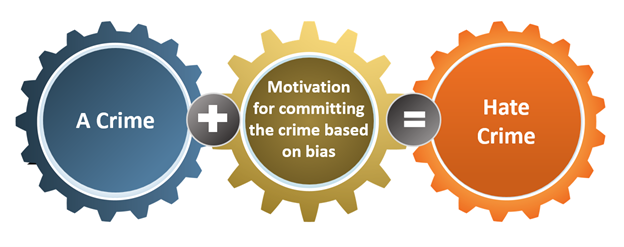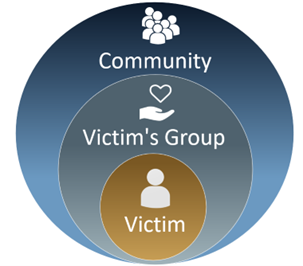Hate crime and bias-motivated incidents
Learn more about hate and bias crime and the resources to get help in King County.
What is a hate crime?

Hate crime offense is a legal term as outlined in RCW 9A.36.080 that is used for crimes committed which are motivated by bias or based on the victim’s perceived membership in a specific group such as race, color, religion, ancestry, national origin, gender, sexual orientation, gender expression or identity, or mental, physical, or sensory disability. A hate crime must include the act of a crime plus the biased motivation.
Crimes can include physical assaults, physical damage or destruction of property, or threats towards a specific person or group of persons and places those individuals in reasonable fear.
Impact of hate and bias crime on individuals and community

Hate and bias crimes are motivated by hostility and/or prejudice against a person based on the victim’s perceived membership in a specific group such as race, color, religion, ancestry, national origin, gender, sexual orientation, gender expression or disability. The impact of such targeted hostility can be extremely traumatizing not only for the individual who was targeted but for the entire group that individual was perceived to represent.
Survivors of hate crime describe that this targeted violence can instill additional layers of trauma as compared to similar crimes lacking bias motivation. It can lead to serious emotional, psychological and behavioral impacts of victims and community members, including but not limited to the following:
- Feeling scared, targeted and worried you will be a victim of hate crime again
- Loss of trust with anyone associated with the perpetrator’s identified group
- Increased symptoms of anxiety and depression
- Overall feeling of being vulnerable and unsafe
- Changes in behaviors and potentially stopping doing things that you usually felt safe doing
- Developing an “us” versus “them” mentality
What to do if you believe you are a victim of a hate crime or bias incident
Report it
Call 911 for immediate assistance.
If the incident occurred in the past, or the immediate danger is over and there are no injuries, call the police department non-emergency number to report what happened.
Record what happened
Write down as much detail about the crime as soon as possible after the crime including the exact language used by the perpetrator. Some choose to use their cell phones to video record the incident if possible.
Research protection orders
Identify if a civil protection order might be a safe next step. Some find filing for an anti-harassment protection order is helpful in preventing further abuse and targeting from a specific individual.
Seek support resources
Lean on trusted friends and family - Identifying a strong support system can help you process through this traumatic incident.
Reach out for help and support - Contact a community agency and ask for help.
Consult with an attorney
Attorney’s can sometimes help you identify what additional legal options you might have following an incident.
Reporting to law enforcement
Federal Bureau of Investigations (FBI) Hate Crimes
- Electronic Tip Form | FBI
- Call 1-800-CALLFBI (225-5324)
- Or the FBi Seattle Division at 206-622-0460
Seattle Police Department (SPD) Hate and Bias Crimes
If the incident is happening now, call 911 immediately.
If the incident occurred in the past, or the immediate danger is over and there are no injuries, call 206-625-5011.
Hate and Bias Crimes - Police | seattle.gov
King County Sheriffs Office (KCSO)
Report to Sheriff - King County, Washington
Community Resources
King County Coalition Against Hate and Bias
Coalition Against Hate and Bias Manager: Phyllis Sutton
- Email: ESJHateBias@kingcounty.gov
- Phone: 206-698-3615
- King County Coalition Against Hate and Bias webpage
Anti-Bias and Anti-Hate Program at Chinese Information Service Center (CISC)
Report the incident to a trusted community-based organization that has been serving immigrants and their families since 1972. We provide free information, referral, and support. All information is confidential and anonymous. CISC is not an emergency service. If community members are in danger, call 911. To anonymously report hate and bias incidents, community members can contact CISC staff at:
- Cantonese-粵語, Mandarin-普通话 or English: 206-886-2667
- Vietnamese or English: 206-294-9053
- Russian or English: 425-326-9479
- Ukrainian or English: 425-326-9479
- Email: antihb@cisc-seattle.org
- Chinese Information Service Center website
 Translate
Translate